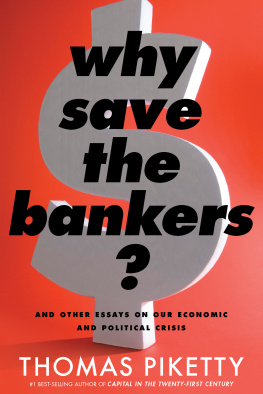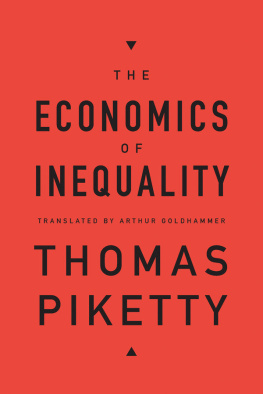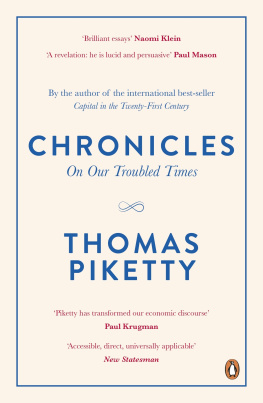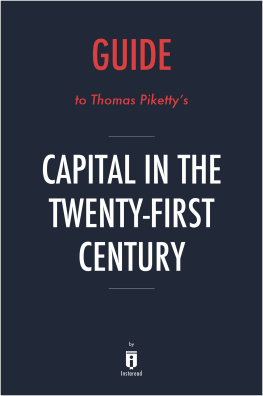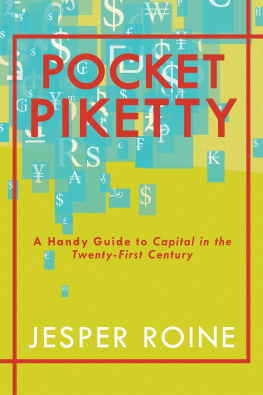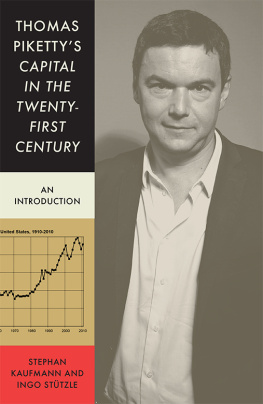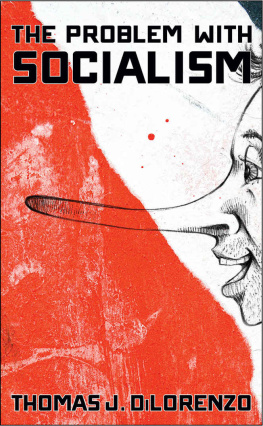Thomas Piketty - Time for socialism : dispatches from a world on fire, 2016-2021
Here you can read online Thomas Piketty - Time for socialism : dispatches from a world on fire, 2016-2021 full text of the book (entire story) in english for free. Download pdf and epub, get meaning, cover and reviews about this ebook. year: 2021, genre: Politics. Description of the work, (preface) as well as reviews are available. Best literature library LitArk.com created for fans of good reading and offers a wide selection of genres:
Romance novel
Science fiction
Adventure
Detective
Science
History
Home and family
Prose
Art
Politics
Computer
Non-fiction
Religion
Business
Children
Humor
Choose a favorite category and find really read worthwhile books. Enjoy immersion in the world of imagination, feel the emotions of the characters or learn something new for yourself, make an fascinating discovery.

- Book:Time for socialism : dispatches from a world on fire, 2016-2021
- Author:
- Genre:
- Year:2021
- Rating:5 / 5
- Favourites:Add to favourites
- Your mark:
- 100
- 1
- 2
- 3
- 4
- 5
Time for socialism : dispatches from a world on fire, 2016-2021: summary, description and annotation
We offer to read an annotation, description, summary or preface (depends on what the author of the book "Time for socialism : dispatches from a world on fire, 2016-2021" wrote himself). If you haven't found the necessary information about the book — write in the comments, we will try to find it.
Time for socialism : dispatches from a world on fire, 2016-2021 — read online for free the complete book (whole text) full work
Below is the text of the book, divided by pages. System saving the place of the last page read, allows you to conveniently read the book "Time for socialism : dispatches from a world on fire, 2016-2021" online for free, without having to search again every time where you left off. Put a bookmark, and you can go to the page where you finished reading at any time.
Font size:
Interval:
Bookmark:
Time for Socialism
Dispatches from a World on Fire, 20162021
THOMAS PIKETTY

Copyright 2021 by Thomas Piketty and Le Monde.
Originally published as Vivement le Socialisme! Chroniques, 20162020, ditions du Seuil, 2020.
All rights reserved.
Translation from the original French by Kristin Couper.
originally appeared in Capital and Ideology by Thomas Piketty, translated by Arthur Goldhammer, Cambridge, Mass.: The Belknap Press of Harvard University Press, Copyright 2020 by the President and Fellows of Harvard College.
originally appeared in Capital in the Twenty-First Century by Thomas Piketty, translated by Arthur Goldhammer, Cambridge, Mass.: The Belknap Press of Harvard University Press, Copyright 2014 by the President and Fellows of Harvard College.
This book may not be reproduced, in whole or in part, including illustrations, in any form (beyond that copying permitted by Sections 107 and 108 of the U.S. Copyright Law and except by reviewers for the public press), without written permission from the publishers.
Yale University Press books may be purchased in quantity for educational, business, or promotional use. For information, please email (U.K. office).
Set in Minion Pro by Westchester Publishing Services.
Library of Congress Control Number: 2021935893
ISBN 978-0-300-25966-7 (hardcover: alk. paper)
A catalogue record for this book is available from the British Library.
This paper meets the requirements of ANSI/NISO Z39.48-1992 (Permanence of Paper).
I f someone had told me in 1990 that I would publish a collection of articles in 2020 entitled Vivement le socialisme! in French, I would have thought it was a bad joke. As an 18-year-old, I had just spent the autumn of 1989 listening to the collapse of the communist dictatorships and real socialism in Eastern Europe on the radio. In February 1990, I took part in a French student trip to support the young people in Romania who had just gotten rid of the regime of Ceauescu. We arrived in the middle of the night at the Bucharest airport, then went by bus to the rather sad and snowy city of Braov, nestled in the arc of the Carpathian Mountains. The young Romanians proudly showed us the impact of bullets on the walls, witnesses of their Revolution. In March 1992, I made my first trip to Moscow, where I saw the same empty shops and the same gray avenues. I had succeeded in becoming one of the participants in a Franco-Russian conference entitled Psychoanalysis and Social Sciences, and it was with a group of French academics, who were a bit lost, that I visited the Lenin Mausoleum and Red Square (the Shrine of the Russian Revolution), where the Russian flag had just replaced the Soviet flag.
Born in 1971, I belong to a generation that did not have time to be tempted by communism, and which became adult when the absolute failure of sovietism was already obvious. Like many, I was more liberal than socialist in the 1990s, as proud as a peacock of my judicious observations, and suspicious of my elders and all those who were nostalgic. I could not stand those who obstinately refused to see that the market economy and private property were part of the solution.
But now, thirty years later, in 2020, hypercapitalism has gone much too far, and I am now convinced that we need to think about a new way of going beyond capitalism, a new form of socialism, participative and decentralized, federal and democratic, ecological, multiracial, and feminist.
History will decide whether the word socialism is definitively dead and must be replaced. For my part, I think that it can be saved, and even that it remains the most appropriate term to describe the idea of an alternative economic system to capitalism. In any case, one cannot just be against capitalism or neoliberalism: one must also and above all be for something else, which requires precisely designating the ideal economic system that one wishes to set up, the just society that one has in mind, whatever name one finally decides to give it. It has become commonplace to say that the current capitalist system has no future, as it deepens inequalities and exhausts the planet. This is not false, except that in the absence of a clearly explained alternative, the current system still has many days ahead of it.
As a social science teacher-researcher, I have specialized in the study of the history of inequalities and the relationship between economic development, wealth distribution, and political conflict, which led me to publish several voluminous books.
Drawing on the lessons of this historical research, and of course on my experience as a citizen-observer of the period 19902020, I have tried in my last book to outline some elements for a participatory socialism; I will summarize the main conclusions here. However, I must make it clear that these elements are only a small starting point among others, a tiny contribution to a huge process of collective elaboration, open discussion, and social and political experimentation, a process which will have to be a long-term one, approached with humility and tenacity, especially in view of the scale of past failures and the challenges to come.
The interested reader will also find some of my considerations in the present study, in which are reproduced all my monthly articles published in the newspaper Le Monde from September 2016 to February 2021, without any modification or rewriting. I have simply added a few additional graphs, tables, references, and texts published on my blog hosted by I would like to point out at the outset that some of the columns have aged less well than others, and I apologize in advance for any repetition. These texts represent nothing more than an imperfect attempt by a social scientist to descend from his ivory tower and his thousand-page books and get involved in the life of the city and in current events, with all the risks that this entails. I hope that the indulgent reader will find some useful leads for his or her own reflections and commitments.
Lets start with a statement that some may find surprising. If we take a long-term perspective, then the long march toward equality and participatory socialism is already well under way. No technical impossibility prevents us from continuing along this already open path, as long as we all get on with it. History shows that inequality is essentially ideological and political, not economic or technological.
This optimistic point of view may certainly seem paradoxical in these times of gloom. Yet it corresponds to reality. Inequalities have been sharply reduced over the long term. This is thanks in particular to the new social and fiscal policies introduced during the twentieth century. Much remains to be done, but the fact is that it is possible to go much further by drawing on the lessons of history.
Consider, for example, the evolution of property concentration over the past two centuries. First of all, we can see that the share of the richest 1% of the total property (i.e., the total real estate, financial, and professional assets, net of debt) was at an astronomical level throughout the nineteenth century and until the beginning of the twentieth centurywhich shows, by the way, that the promise of equality of the French Revolution was more theoretical than real, at least as far as the redistribution of property is concerned. It can then be observed that the share of the richest 1% of the population fell sharply during the twentieth century: it was around 55% of total wealth on the eve of World War I and is now close to 25%. However, it should be noted that this share is still about five times higher than that held by the poorest 50%, who currently own just over 5% of the total wealth (despite the fact that they are by definition fifty times more numerous than the richest 1%). The cherry on the cake is that this low share has also been declining since the 1980s and 1990s, a trend that can also be observed in the United States, Germany, and the rest of Europe, as well as in India, Russia, and China.
Next pageFont size:
Interval:
Bookmark:
Similar books «Time for socialism : dispatches from a world on fire, 2016-2021»
Look at similar books to Time for socialism : dispatches from a world on fire, 2016-2021. We have selected literature similar in name and meaning in the hope of providing readers with more options to find new, interesting, not yet read works.
Discussion, reviews of the book Time for socialism : dispatches from a world on fire, 2016-2021 and just readers' own opinions. Leave your comments, write what you think about the work, its meaning or the main characters. Specify what exactly you liked and what you didn't like, and why you think so.

